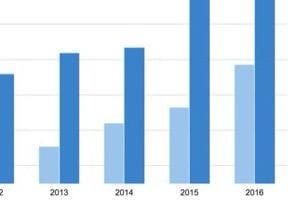Sales tax calculation, collection, and remittance remain a challenge for ecommerce businesses. The 45 states plus Washington D.C. with a retail sales tax are all eager to obligate ecommerce merchants on sales made to resident consumers.
To do that, a state must be able to assert a seller has “nexus” with the state where the customer resides. The current nexus standard is for the seller to have a physical presence within that state.
In the last few years, however, many states have promulgated laws and regulations that attempt to supersede the physical presence standard and impose an obligation on sellers to collect sales taxes based on the volume of sales to in-state customers. The effectiveness of these “economic nexus” rules is unclear. But they are not the only novel manner developed by states to impose a collection obligation on out-of-state sellers.
The state of Washington, for example, recently began enforcement of regulations that require marketplaces with a physical presence in Washington (or annual sales to residents of at least $10,000) to collect on behalf of third party sellers who utilize the marketplace’s platform.
In the last few years, however, many states have promulgated laws and regulations that attempt to supersede the physical presence standard…
Marketplaces in Washington
The new state of Washington law works as follows.
A “marketplace facilitator” contracts with sellers to facilitate sales of their products. The new rules are not ecommerce specific, but they focus on sales made via the internet.
The rules define “facilitation of sales” by a marketplace as directly or indirectly transmitting or otherwise communicating an offer or acceptance between the buyer and seller; owning or operating the infrastructure (electronic or physical) or technology that brings buyers and sellers together; providing a virtual currency that buyers can use to purchase products from the seller; or engaging in software development or research and development activities related to the seller’s products.
A marketplace facilitator is obligated to comply with the new rules once it conducts any of the following services for the seller: payment processing, fulfillment or storage, listing products for sale, setting prices, branding sales as those of the marketplace, order taking, advertising or promotion, providing customer service, or accepting or assisting with returns or exchanges.
Washington left few stones unturned in defining a marketplace facilitator. Certainly Amazon, which is based in Washington, is a marketplace facilitator. But so are Ebay, Walmart, and other marketplaces that have a nexus with Washington — warehouses, employees, offices.
The broad scope of the rules leaves little chance that online selling platforms can exclude themselves. Minnesota has passed similar rules but extended the effective date, and other states are looking at this type of rule as well.
The Washington rules are effective as of January 1, 2018. They lay out a choice for marketplace facilitators with a physical presence in Washington: collect sales tax on behalf of third party sellers or provide notice to Washington customers of their potential use tax obligations. (A use tax is a mirror image of a sales tax; a use tax is due on taxable sales when no sales tax is collected.)
Affect on Retailers
If your company is a retail seller with a physical presence in Washington, the new rules don’t provide any cover from the basic sales tax nexus precedent: retail sellers with physical presence in Washington are obligated to register with the state as a vendor and calculate, collect, and remit sales taxes. If a retailer is currently remitting sales taxes in Washington for sales made via marketplaces, the taxes are collected by those marketplaces are deducted from the seller’s sales tax obligation.
If your company lacks a physical presence in Washington (a “remote seller”) but sells via online marketplaces with Washington presence, the new rules will directly impact your sales — your customers will start paying tax or they will receive notice of potential use tax obligations.
The core of the new rules requires marketplace facilitators with a physical presence in the state to collect sales taxes due on behalf of remote sellers or elect to provide notice to the Washington customers of their use tax obligation. If a marketplace provider elects to notify customers of their use tax obligation instead of collecting sales tax, the marketplace is also obligated to report taxable sales due from Washington residents annually to the state Department of Revenue.
If your company lacks a physical presence in Washington (a “remote seller”) but sells via online marketplaces with Washington presence, the new rules will directly impact your sales…
The penalties for non-compliance with the notice and reporting rules are stiff: fines can reach triple digits quickly and accumulate rapidly. Also, the marketplace facilitator must provide conspicuous general notice on its website and on individual sale documents that use tax is due, or face another tier of fines.
The alternative for marketplace providers is to calculate, collect, and remit Washington sales tax on behalf of sellers who lack Washington nexus. Given the unique and complex notice and reporting requirements, it is not surprising some Washington marketplace facilitators have already begun collection of retail sales taxes on behalf of remote sellers. The marketplace facilitator must report and remit the taxes they collect on a remote seller’s behalf.
The new Washington regulations also provide unique rules and obligations for marketplace facilitators who lack a physical presence in Washington, and for referrers with or without a physical presence in Washington (referrers connect buyers with sellers but do not facilitate sales) and the sellers who utilize them.
Presumably “referrers” describe affiliate marketing. But the text is vague. There is little guidance beyond being all-encompassing to include, apparently, any referring entity.
Hopefully, this article not only sheds some light on the new Washington rules but also identifies a potential new wrinkle in ecommerce sales tax compliance that may see broader adoption by other states. Besides customers paying tax or receiving notice, the new rules may result in some obligations and reporting requirements for ecommerce retailers.



